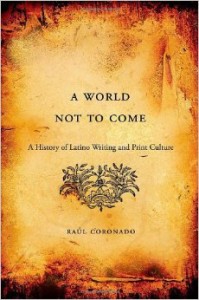As book review editor, I’m proud to present our latest round table discussion–on Raul Coronado’s A World Not to Come: A History of Latino Writing and Print Culture. Here at the Society, we always strive to expand our horizons of what historians should consider “United States Intellectual History.” Coronado’s book speaks to an opportunity open in American historiography–the study of Latino/a thought and culture and its impact on U.S. culture, thought, and society. Special thanks to Tim Lacy and the Publications Committee for their support, Andrew Seal for his always valuable assistance, and a VERY special thanks to Lilian Calles Barger, assistant book review editor. This round table was her idea and she carried it out to the end. Look for the rest of the round table to unfold this week, starting here with Dr. Philip Lorenz. We continue with Dr. Tamar Herzog’s post. Here is Dr. Ralph Bauer’s commentary. Here is Dr. Beatriz Gonzalez-Stephan’s take. Finally we have the response by Dr. Coronado himself.–Robert Greene II, book review editor.
Raúl Coronado, A World Not to Come: A History of Latino Writing and Print Culture (Harvard University Press, 2013) 555 pages.
By Lilian Calles Barger, Assistant Book Review Editor
It’s a pleasure to introduce this round table of Raúl Coronado’s A World Not to Come: A History of Latino Writing and Print Culture. I took up organizing a round table after hearing of Coronado’s book at the Society’s October 2014 conference in Indianapolis. There the book received an honorable mention at our annual book award. Growing up as a Latin  American immigrant I had an intimate experience with Latino culture in Texas. I would say it was my first enduring North American experience. Having done a field of study in Latin American thought, I was immediately curious to know what Coronado was up to since it is impossible to define Latino/a culture as a homogeneous community. I swiftly bought my copy and was not disappointed.
American immigrant I had an intimate experience with Latino culture in Texas. I would say it was my first enduring North American experience. Having done a field of study in Latin American thought, I was immediately curious to know what Coronado was up to since it is impossible to define Latino/a culture as a homogeneous community. I swiftly bought my copy and was not disappointed.
Latinos currently comprise 17% of the U.S. population and with increased prospects for a Latino president within the next few election cycles, political analysts and pundits are struggling to understand how Latinos will vote with their combined values of hard work, traditional kinship ties, respect for religion, and commitment to social welfare. Historians are pressed by events to look back at the many ways this diverse group contributed to wide swaths of American culture and politics. In a thoroughly research and well-written book, Coronado has ventured into a neglected area of U.S. intellectual history – Latino American thought. Coronado recovers ideas long buried in the memory of the Tejano community of Texas and his work, I believe, opens up new avenues for understanding both the persistent sense of crisis experienced by modern America and what Latinos bring to U.S. political culture. You the reader, I will boldly declare, are witnessing the birth of an exciting field of inquiry. Comments and questions raised by Coronado and his interlocutors illuminate how we view the development and dominance of Anglo-American thought in the U.S. and the place of Latinos in the historiography. My hope is that you will enjoy the profusion of ideas engaged here as much as I did.
Our panelists are a distinguished group of scholars with expertise and insight in transnational history, literature, politics, and culture. They include Philip Lorenz, associate professor in English and Spanish literature and drama of the sixteenth and seventeenth centuries at Cornell University (post here); Tamar Herzog, Monroe Gutman Professor of Latin American Affairs and Professor of Spanish and Portuguese history at Harvard University; Ralph Bauer, associate professor in the English Department at the University of Maryland specializing in the literatures and cultures of the early Americas, as well as hemispheric American and early modern Atlantic studies; and Beatriz Gonzalez-Stephan, Lee Hage Jamail Chair of Latin American Literature and professor in Spanish & Portuguese at Rice University. Their careful reading of Coronado’s book and thoughtful comments are much appreciated. Thank you to all! A special thank you to Raúl Coronado for his cooperation and participation in this round table. –Assistant book review editor, Lilian Calles Barger.
University. Their careful reading of Coronado’s book and thoughtful comments are much appreciated. Thank you to all! A special thank you to Raúl Coronado for his cooperation and participation in this round table. –Assistant book review editor, Lilian Calles Barger.

0